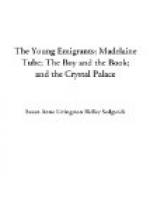Teuzer examined the pieces attentively, they were of fine china, and ornamented with painted flowers. “So that one must not see the crack,” he repeated, “it will be difficult—but we will try.” So saying, he laid the pieces on one side, and returned to his work. But the little girl, looking much disappointed, said, “Ah, sir, have the kindness to mend the cup immediately, I will wait until it is done.”
The potter and his workmen began to laugh; “then,” said the former, “you will have long enough to wait, for after being cemented, the cup must be baked. It will be three days before I heat the furnace again, and it will be five before you can have your cup.”
The child looked disappointed, and Teuzer continued, “Ah, I see why you are up so early—your mother does not know that you have broken the cup, and you wanted to have it mended before she is awake. I am right I see—go then and tell your mother the exact truth—that will be best, will it not?”
The little girl said “Yes,” in a low voice, and went away.
Very early on the following morning the child returned.
“I told you,” said Teuzer, frowning, “that you could not have your cup for five days.”
“It is not for that I have come,” replied the child, “but I have brought you something else to mend,”—and she took from her apron the pieces of a brown jar.
Teuzer laughed again, and said, “We can do nothing with this—you think it is china because it is glazed, but it is from the Waldenburg pottery, and quite a different clay from ours. It would be a fine thing indeed if we could mend all the broken jars in Dresden, we should then be soon obliged to shut up shop, and eat dry bread—throw away the pieces, child.”
The little girl turned pale, “The jar is not ours,” she said, crying, “it belongs to Mrs. Abendroth, who sent us some broth.”
“I am sorry for it,” replied Teuzer, “but you must be more careful in using other people’s things.”
“It was not my fault,” said the child—“my poor mother has the rheumatism in her hands, and cannot hold anything firmly—and she let it fall. Have you jars of this kind, and how much would one of this size cost?”
Teuzer felt moved with compassion, “I have a few in the warehouse,” he answered, “but they are three times as dear as the common ones.”
He went to look for one to make a present to the little girl, but on his return, chancing to glance into her apron, he saw a little paper parcel. “What have you there,” he asked, “coffee or sugar?”
The little girl hesitated a moment. She was almost afraid to tell him what she had in her apron. She thought he might possibly suspect that she had been taking something which did not belong to her. Still, she hesitated but a moment. She felt that she was honest, and she saw no good reason why he should doubt her honesty. So she said,
“It is seed for our canary, our pretty Jacot. He is a dear little creature, and he has had nothing to eat for a long time. How glad he will be to get it.”




